[The Holy Bible]
Peter Denies Christ
(21) Jesus Warns of Further Desertions
31 Then Jesus told
them, “This very night you will all fall away on account of me, for it is
written:
“‘I will strike the shepherd,
and the sheep of the flock will be scattered.’
32 But after I have risen, I will go ahead of you into
Galilee.”
33 Peter replied, “Even if all fall away on account of
you, I never will.”
34 “Truly I tell you,” Jesus answered, “this very night,
before the rooster crows, you will disown me three times.”
35 But Peter declared, “Even if I have to die with you, I
will never disown you.” And all the other disciples said the same.
27 “You will all fall
away,” Jesus told them, “for it is written:
“‘I will strike the shepherd,
and the sheep will be scattered.’
28 But after I have risen, I will go ahead of you into
Galilee.”
29 Peter declared, “Even if all fall away, I will not.”
30 “Truly I tell you,” Jesus answered, “today—yes,
tonight—before the rooster crows twice[e] you yourself will disown me three
times.”
31 But Peter insisted emphatically, “Even if I have to die
with you, I will never disown you.” And all the others said the same.
e. Some early manuscripts do not have twice.
31 “Simon, Simon, Satan
has asked to sift all of you as wheat. 32 But I have prayed for you, Simon, that
your faith may not fail. And when you have turned back, strengthen your
brothers.”
33 But he replied, “Lord, I am ready to go with you to
prison and to death.”
34 Jesus answered, “I tell you, Peter, before the rooster
crows today, you will deny three times that you know me.”
36 Simon Peter asked
him, “Lord, where are you going?”
Jesus replied, “Where I am going, you cannot follow now,
but you will follow later.”
37 Peter asked, “Lord, why can’t I follow you now? I will
lay down my life for you.”
38 Then Jesus answered, “Will you really lay down your
life for me? Very truly I tell you, before the rooster crows, you will disown me
three times!
c. Many early manuscripts do not have If God is glorified in him.
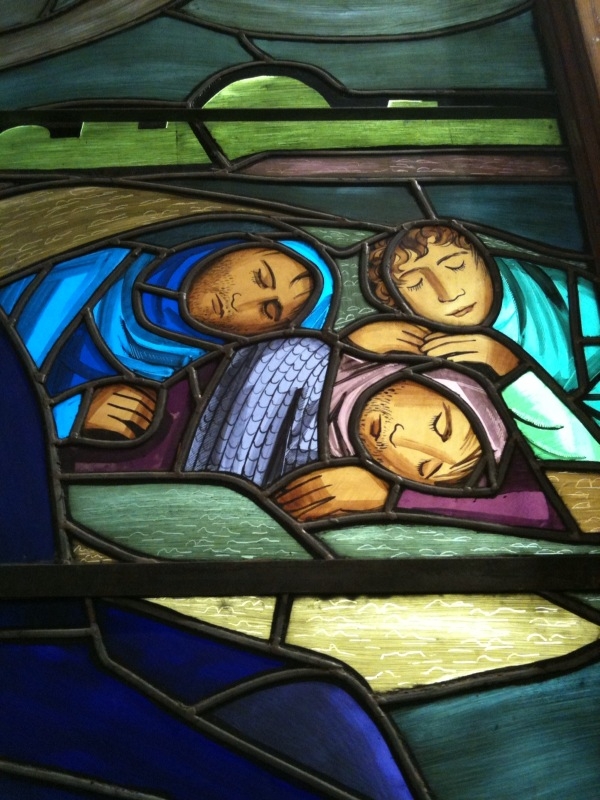 |
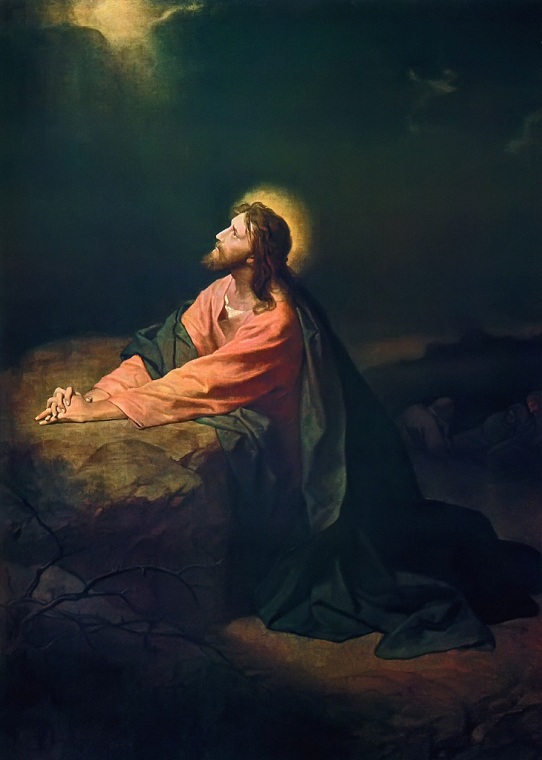 |
 |
36 Then Jesus went with
his disciples to a place called Gethsemane, and he said to them, “Sit here while
I go over there and pray.” 37 He took Peter and the two sons of Zebedee along
with him, and he began to be sorrowful and troubled. 38 Then he said to them,
“My soul is overwhelmed with sorrow to the point of death. Stay here and keep
watch with me.”
39 Going a little farther, he fell with
his face to the ground and prayed, “My Father, if it is possible, may this cup
be taken from me. Yet not as I will, but as you will.”
40 Then he returned to his disciples and
found them sleeping. “Couldn’t you men keep watch with me for one hour?” he
asked Peter. 41 “Watch and pray so that you will not fall into temptation. The
spirit is willing, but the flesh is weak.”
42 He went away a second time and prayed,
“My Father, if it is not possible for this cup to be taken away unless I drink
it, may your will be done.”
43 When he came back, he again found them
sleeping, because their eyes were heavy. 44 So he left them and went away once
more and prayed the third time, saying the same thing.
45 Then he returned to the disciples and
said to them, “Are you still sleeping and resting? Look, the hour has come, and
the Son of Man is delivered into the hands of sinners. 46 Rise! Let us go! Here
comes my betrayer!”
32 They went to a place
called Gethsemane, and Jesus said to his disciples, “Sit here while I pray.” 33
He took Peter, James and John along with him, and he began to be deeply
distressed and troubled. 34 “My soul is overwhelmed with sorrow to the point of
death,” he said to them. “Stay here and keep watch.”
35 Going a little farther, he fell to the
ground and prayed that if possible the hour might pass from him. 36 “Abba,[f]
Father,” he said, “everything is possible for you. Take this cup from me. Yet
not what I will, but what you will.”
37 Then he returned to his disciples and
found them sleeping. “Simon,” he said to Peter, “are you asleep? Couldn’t you
keep watch for one hour? 38 Watch and pray so that you will not fall into
temptation. The spirit is willing, but the flesh is weak.”
39 Once more he went away and prayed the
same thing. 40 When he came back, he again found them sleeping, because their
eyes were heavy. They did not know what to say to him.
41 Returning the third time, he said to
them, “Are you still sleeping and resting? Enough! The hour has come. Look, the
Son of Man is delivered into the hands of sinners. 42 Rise! Let us go! Here
comes my betrayer!”
f. Aramaic for father.
39 Jesus went out as
usual to the Mount of Olives, and his disciples followed him. 40 On reaching the
place, he said to them, “Pray that you will not fall into temptation.” 41 He
withdrew about a stone’s throw beyond them, knelt down and prayed, 42 “Father,
if you are willing, take this cup from me; yet not my will, but yours be done.”
43 An angel from heaven appeared to him and strengthened him. 44 And
being in anguish, he prayed more earnestly, and his sweat was like drops of
blood falling to the ground.[c]
45 When he rose from prayer and went back to the
disciples, he found them asleep, exhausted from sorrow.
46 “Why are you sleeping?” he asked them. “Get up and pray
so that you will not fall into temptation.”
c. Many early manuscripts do not have verses 43 and 44.
1 When he had finished
praying, Jesus left with his disciples and crossed the Kidron Valley. On the
other side there was a garden, and he and his disciples went into it.
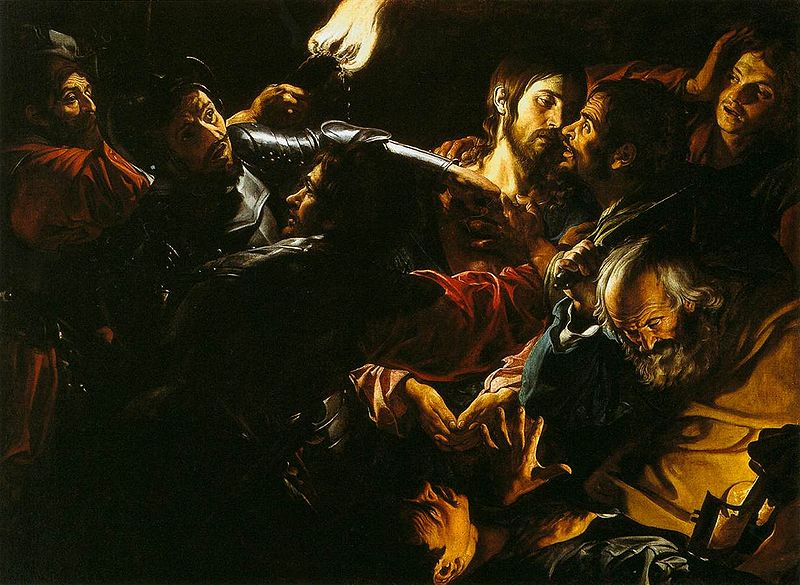 |
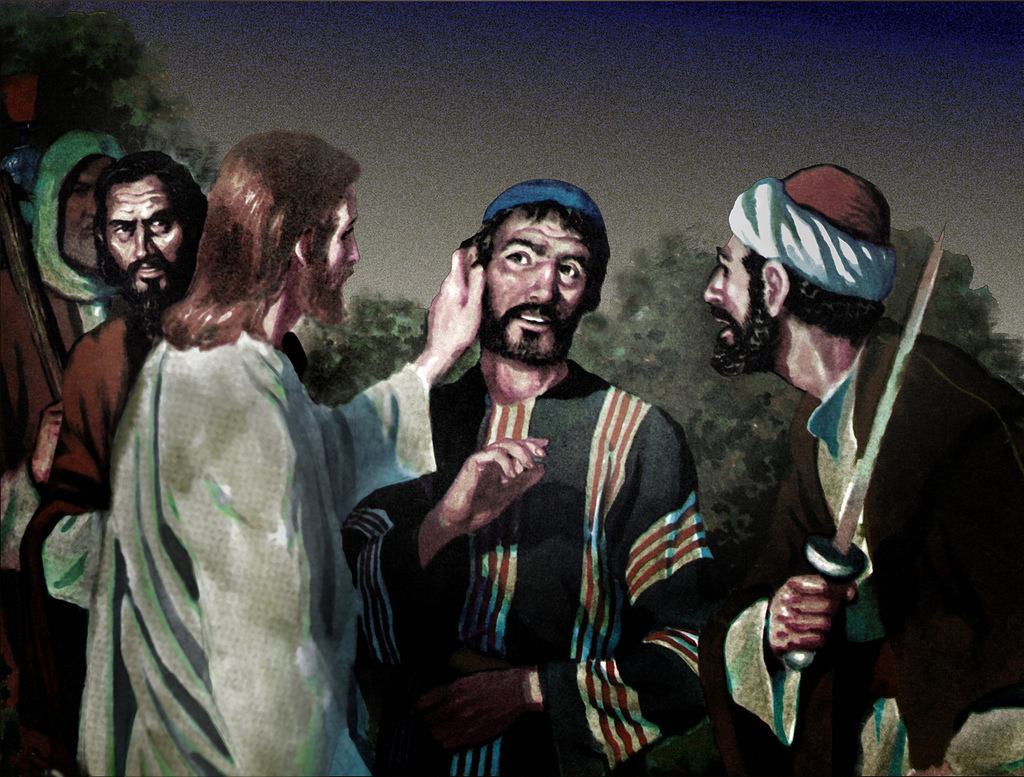 |
47 While he was still
speaking, Judas, one of the Twelve, arrived. With him was a large crowd armed
with swords and clubs, sent from the chief priests and the elders of the people.
48 Now the betrayer had arranged a signal with them: “The one I kiss is the man;
arrest him.” 49 Going at once to Jesus, Judas said, “Greetings, Rabbi!” and
kissed him.
50 Jesus replied, “Do what you came for,
friend.”
Then the men stepped forward, seized
Jesus and arrested him. 51 With that, one of Jesus’ companions reached for his
sword, drew it out and struck the servant of the high priest, cutting off his
ear.
52 “Put your sword back in its place,”
Jesus said to him, “for all who draw the sword will die by the sword. 53 Do you
think I cannot call on my Father, and he will at once put at my disposal more
than twelve legions of angels? 54 But how then would the Scriptures be fulfilled
that say it must happen in this way?”
55 In that hour Jesus said to the crowd,
“Am I leading a rebellion, that you have come out with swords and clubs to
capture me? Every day I sat in the temple courts teaching, and you did not
arrest me. 56 But this has all taken place that the writings of the prophets
might be fulfilled.” Then all the disciples deserted him and fled.
43 Just as he was
speaking, Judas, one of the Twelve, appeared. With him was a crowd armed with
swords and clubs, sent from the chief priests, the teachers of the law, and the
elders.
44 Now the betrayer had arranged a signal
with them: “The one I kiss is the man; arrest him and lead him away under
guard.” 45 Going at once to Jesus, Judas said, “Rabbi!” and kissed him. 46 The
men seized Jesus and arrested him. 47 Then one of those standing near drew his
sword and struck the servant of the high priest, cutting off his ear.
48 “Am I leading a rebellion,” said
Jesus, “that you have come out with swords and clubs to capture me? 49 Every day
I was with you, teaching in the temple courts, and you did not arrest me. But
the Scriptures must be fulfilled.” 50 Then everyone deserted him and fled.
51 A young man, wearing nothing but a
linen garment, was following Jesus. When they seized him, 52 he fled naked,
leaving his garment behind.
47 While he was still
speaking a crowd came up, and the man who was called Judas, one of the Twelve,
was leading them. He approached Jesus to kiss him, 48 but Jesus asked him,
“Judas, are you betraying the Son of Man with a kiss?”
49 When Jesus’ followers saw what was
going to happen, they said, “Lord, should we strike with our swords?” 50 And one
of them struck the servant of the high priest, cutting off his right ear.
51 But Jesus answered, “No more of this!”
And he touched the man’s ear and healed him.
52 Then Jesus said to the chief priests,
the officers of the temple guard, and the elders, who had come for him, “Am I
leading a rebellion, that you have come with swords and clubs? 53 Every day I
was with you in the temple courts, and you did not lay a hand on me. But this is
your hour—when darkness reigns.”
2 Now Judas, who
betrayed him, knew the place, because Jesus had often met there with his
disciples. 3 So Judas came to the garden, guiding a detachment of soldiers and
some officials from the chief priests and the Pharisees. They were carrying
torches, lanterns and weapons.
4 Jesus, knowing all that was going to
happen to him, went out and asked them, “Who is it you want?”
5 “Jesus of Nazareth,” they replied.
“I am he,” Jesus said. (And Judas the
traitor was standing there with them.) 6 When Jesus said, “I am he,” they drew
back and fell to the ground.
7 Again he asked them, “Who is it you
want?”
“Jesus of Nazareth,” they said.
8 Jesus answered, “I told you that I am
he. If you are looking for me, then let these men go.” 9 This happened so that
the words he had spoken would be fulfilled: “I have not lost one of those you
gave me.”
10 Then Simon Peter, who had a sword,
drew it and struck the high priest’s servant, cutting off his right ear. (The
servant’s name was Malchus.)
11 Jesus commanded Peter, “Put your sword
away! Shall I not drink the cup the Father has given me?”
12 Then the detachment of soldiers with
its commander and the Jewish officials arrested Jesus. They bound him 13 and
brought him first to Annas, who was the father-in-law of Caiaphas, the high
priest that year. 14 Caiaphas was the one who had advised the Jewish leaders
that it would be good if one man died for the people.
57 Those who had arrested Jesus took him to Caiaphas the high priest, where the teachers of the law and the elders had assembled. 58 But Peter followed him at a distance, right up to the courtyard of the high priest. He entered and sat down with the guards to see the outcome.
53 They took Jesus to the high priest, and all the chief priests, the elders and the teachers of the law came together. 54 Peter followed him at a distance, right into the courtyard of the high priest. There he sat with the guards and warmed himself at the fire.
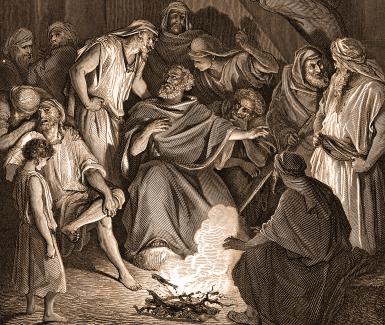
69 Now Peter was sitting out in the
courtyard, and a servant girl came to him. “You also were with Jesus of
Galilee,” she said.
70 But he denied it before them all. “I don’t know what you’re talking about,”
he said.
66 While Peter was below in the courtyard,
one of the servant girls of the high priest came by. 67 When she saw Peter
warming himself, she looked closely at him.
“You also were with that Nazarene, Jesus,” she said.
68 But he denied it. “I don’t know or understand what you’re talking about,” he
said, and went out into the entryway.[g]
g. Some early manuscripts entryway and the rooster crowed
54 Then seizing him, they led him away
and took him into the house of the high priest. Peter followed at a distance. 55
And when some there had kindled a fire in the middle of the courtyard and had
sat down together, Peter sat down with them. 56 A servant girl saw him seated
there in the firelight. She looked closely at him and said, “This man was with
him.”
57 But he denied it. “Woman, I don’t know him,” he said.
15 Simon Peter and another disciple were
following Jesus. Because this disciple was known to the high priest, he went
with Jesus into the high priest’s courtyard, 16 but Peter had to wait outside at
the door. The other disciple, who was known to the high priest, came back, spoke
to the servant girl on duty there and brought Peter in.
17 “You aren’t one of this man’s disciples too, are you?” she asked Peter.
He replied, “I am not.”
18 It was cold, and the servants and officials stood around a fire they had made
to keep warm. Peter also was standing with them, warming himself.
72 He denied it again, with an oath: “I don’t know the man!” 73 After a little while, those standing there went up to Peter and said, “Surely you are one of them; your accent gives you away.”
74 Then he began to call down curses, and he swore to them, “I don’t know the man!”
Immediately a rooster crowed. 75 Then Peter remembered the word Jesus had spoken: “Before the rooster crows, you will disown me three times.” And he went outside and wept bitterly.
After a little while, those standing near said to Peter, “Surely you are one of them, for you are a Galilean.”
71 He began to call down curses, and he swore to them, “I don’t know this man you’re talking about.”
72 Immediately the rooster crowed the second time.[h] Then Peter remembered the word Jesus had spoken to him: “Before the rooster crows twice[i] you will disown me three times.” And he broke down and wept.
h. Some early manuscripts do not have the second time.
i. Some early manuscripts do not have twice.
“Man, I am not!” Peter replied. 59 About an hour later another asserted, “Certainly this fellow was with him, for he is a Galilean.”
60 Peter replied, “Man, I don’t know what you’re talking about!” Just as he was speaking, the rooster crowed. 61 The Lord turned and looked straight at Peter. Then Peter remembered the word the Lord had spoken to him: “Before the rooster crows today, you will disown me three times.” 62 And he went outside and wept bitterly.
25 Meanwhile, Simon Peter was still standing
there warming himself. So they asked him, “You aren’t one of his disciples too,
are you?”
He denied it, saying, “I am not.”
26 One of the high priest’s servants, a relative of the man whose ear Peter had
cut off, challenged him, “Didn’t I see you with him in the garden?” 27 Again
Peter denied it, and at that moment a rooster began to crow.
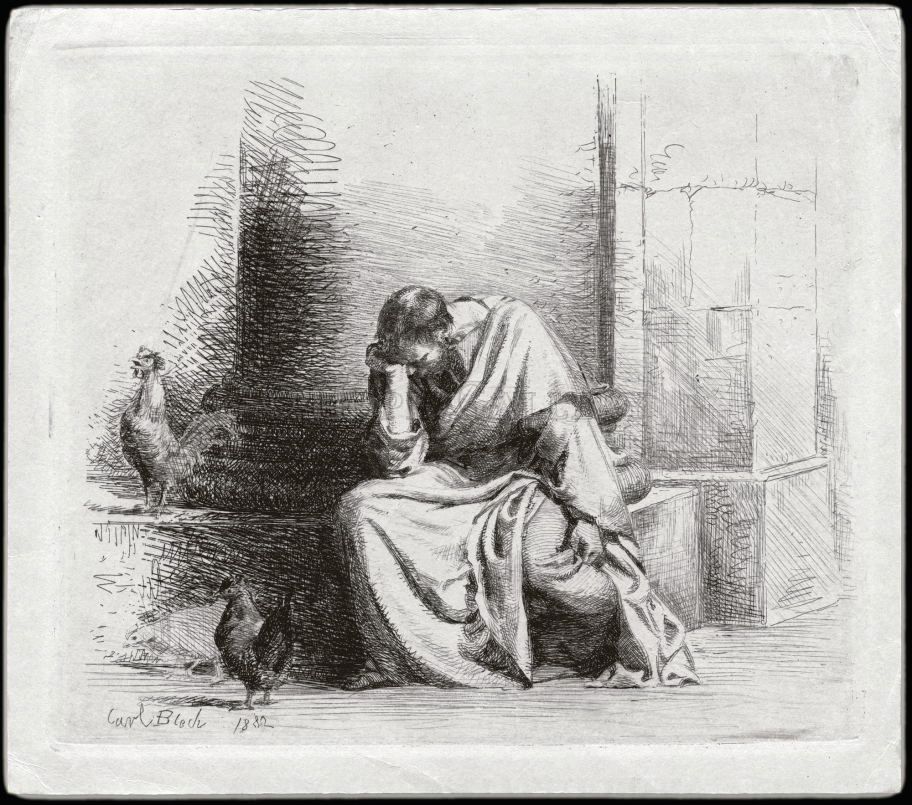
Carl Bloch 1882
1 [a]After this, Jesus revealed himself again to his disciples at the Sea of Tiberias. He revealed himself in this way. 2 Together were Simon Peter, Thomas called Didymus, Nathanael from Cana in Galilee, Zebedee’s sons,[b] and two others of his disciples. 3 [c]Simon Peter said to them, “I am going fishing.” They said to him, “We also will come with you.” So they went out and got into the boat, but that night they caught nothing. 4 When it was already dawn, Jesus was standing on the shore; but the disciples did not realize that it was Jesus.5 Jesus said to them, “Children, have you caught anything to eat?” They answered him, “No.” 6 So he said to them, “Cast the net over the right side of the boat and you will find something.” So they cast it, and were not able to pull it in because of the number of fish. 7 So the disciple whom Jesus loved said to Peter, “It is the Lord.” When Simon Peter heard that it was the Lord, he tucked in his garment, for he was lightly clad, and jumped into the sea. 8 The other disciples came in the boat, for they were not far from shore, only about a hundred yards, dragging the net with the fish.9 [d]When they climbed out on shore, they saw a charcoal fire with fish on it and bread. 10 Jesus said to them, “Bring some of the fish you just caught.” 11 So Simon Peter went over and dragged the net ashore full of one hundred fifty-three[e] large fish. Even though there were so many, the net was not torn. 12 Jesus said to them, “Come, have breakfast.” And none of the disciples dared to ask him,[f] “Who are you?” because they realized it was the Lord. 13 Jesus came over and took the bread and gave it to them, and in like manner the fish. 14 [g]This was now the third time Jesus was revealed to his disciples after being raised from the dead.
Jesus and Peter
15 When they had finished breakfast, Jesus said to Simon Peter,[i]“Simon, son of John, do you love me (agapas me) more than these?”[j] He said to him, “Yes, Lord, you know that I love you (philō se).” He said to him, “Feed my lambs.” 16 He then said to him a second time, “Simon, son of John, do you love me (agapas me)?” He said to him, “Yes, Lord, you know that I love you (philō se).” He said to him, “Tend my sheep.” 17 He said to him the third time, “Simon, son of John, do you love me (phileis me)?” Peter was distressed that he had said to him a third time, “Do you love me?” and he said to him, “Lord, you know everything; you know that I love you (philō se).” [Jesus] said to him, “Feed my sheep. 18 [k] Amen, amen, I say to you, when you were younger, you used to dress yourself and go where you wanted; but when you grow old, you will stretch out your hands, and someone else will dress you and lead you where you do not want to go.” 19 He said this signifying by what kind of death he would glorify God. And when he had said this, he said to him, “Follow me.”
The Beloved Disciple.
20 Peter turned and saw the disciple following whom Jesus loved, the one who had also reclined upon his chest during the supper and had said, “Master, who is the one who will betray you?” 21 When Peter saw him, he said to Jesus, “Lord, what about him?” 22 Jesus said to him, “What if I want him to remain until I come?[l] What concern is it of yours? You follow me.” 23 [m]So the word spread among the brothers that that disciple would not die. But Jesus had not told him that he would not die, just “What if I want him to remain until I come? [What concern is it of yours?]” Conclusion. 24 It is this disciple who testifies to these things and has written them,[n]and we know that his testimony is true. 25 There are also many other things that Jesus did, but if these were to be described individually, I do not think the whole world would contain the books that would be written.
[a] There are many non-Johannine peculiarities in this chapter, some suggesting Lucan Greek style; yet this passage is closer to John than Jn 7:53–8:11. There are many Johannine features as well. Its closest parallels in the synoptic gospels are found in Lk 5:1–11 and Mt 14:28–31. Perhaps the tradition was ultimately derived from John but preserved by some disciple other than the writer of the rest of the gospel. The appearances narrated seem to be independent of those in Jn 20. Even if a later addition, the chapter was added before publication of the gospel, for it appears in all manuscripts.
[b] Zebedee’s sons: the only reference to James and John in this gospel (but see note on Jn 1:37). Perhaps the phrase was originally a gloss to identify, among the five, the two others of his disciples. The anonymity of the latter phrase is more Johannine (Jn 1:35). The total of seven may suggest the community of the disciples in its fullness.
[c]This may be a variant of Luke’s account of the catch of fish; see note on Lk 5:1–11.
[d] It is strange that Jesus already has fish since none have yet been brought ashore. This meal may have had eucharistic significance for early Christians since Jn 21:13 recalls Jn 6:11 which uses the vocabulary of Jesus’ action at the Last Supper; but see also note on Mt 14:19. 21:11 The exact number 153 is probably meant to have a symbolic meaning in relation to the apostles’ universal mission; Jerome claims that Greek zoologists catalogued 153 species of fish. Or 153 is the sum of the numbers from 1 to 17. Others invoke Ez 47:10.
[e] None…dared to ask him: is Jesus’ appearance strange to them? Cf. Lk 24:16; Mk 16:12;
[f] The disciples do, however, recognize Jesus before the breaking of the bread (opposed to Lk 24:35).
[g] This verse connects Jn 20 and 21; cf. Jn 20:19, 26.
[h] This section constitutes Peter’s rehabilitation and emphasizes his role in the church.
[i] In these three verses there is a remarkable variety of synonyms: two different Greek verbs for love(see note on Jn 15:13); two verbs for feed/tend; two nouns for sheep; two verbs for know. But apparently there is no difference of meaning. The threefold confession of Peter is meant to counteract his earlier threefold denial (Jn 18:17, 25, 27). The First Vatican Council cited these verses in defining that Jesus after his resurrection gave Peter the jurisdiction of supreme shepherd and ruler over the whole flock.
[j] More than these: probably “more than these disciples do” rather than “more than you love them” or “more than you love these things [fishing, etc.].”
[k] Originally probably a proverb about old age, now used as a figurative reference to the crucifixion of Peter.
[l] Until I come: a reference to the parousia.
[m] This whole scene takes on more significance if the disciple is already dead. The death of the apostolic generation caused problems in the church because of a belief that Jesus was to have returned first. Loss of faith sometimes resulted; cf. 2 Pt 3:4.
[n] Who…has written them: this does not necessarily mean he wrote them with his own hand. The same expression is used in Jn 19:22 of Pilate, who certainly would not have written the inscription himself. We know: i.e., the Christian community; cf. Jn 1:14, 16.